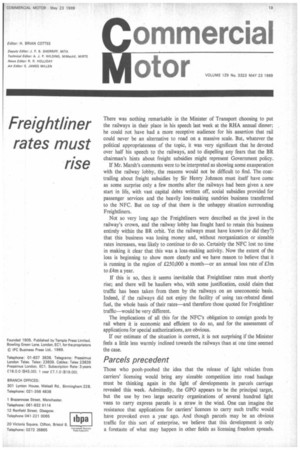ommercial
Page 21

If you've noticed an error in this article please click here to report it so we can fix it.
otor VOLUME 129 No. 3323 MAY 23 1969 There was nothing remarkable in the Minister of Transport choosing to put the railways in their place in his speech last week at the RHA annual dinner; he could not have had a more receptive audience for his assertion that rail could never be an alternative to road on a massive scale. But, whatever the political appropriateness of the topic, it was very significant that he devoted over half his speech to the railways, and to dispelling any fears that the BR chairman's hints about freight subsidies might represent Government policy. If Mr. Marsh's comments were to be interpreted as showing some exasperation with the railway lobby, the reasons would not be difficult to find. The coat trailing about freight subsidies by Sir Henry Johnson must itself have come as some surprise only a few months after the railways had been given a new start in life, with vast capital debts written off, social subsidies provided for passenger services and the heavily loss-making sundries business transferred to the NFC. But on top of that there is the unhappy situation surrounding Freightliners.
Not so very long ago the Freightliners were described as the jewel in the railway's crown., and the railway lobby has fought hard to retain this business entirely within the BR orbit. Yet the railways must have known (or did they?) that this business was losing money and, without reorganization or sizeable rates increases, was likely to continue to do so. Certainly the NFC lost no time in making it clear that this was a loss-making activity. Now the extent of the loss is beginning to show more clearly and we have reason to believe that it is running in the region of £250,000 a month—or an annual loss rate of nm to £4m a year.
If this is so, then it seems inevitable that Freightliner rates must shortly rise; and there will be hauliers who, with some justification, could claim that traffic has been taken from them by the railways on an uneconomic basis. Indeed, if the railways did not enjoy the facility of using tax-rebated diesel fuel, the whole basis of their rates—and therefore those quoted for Freightliner traffic—would be very different.
The implications of all this for the NFC's obligation to consign goods by rail where it is economic and efficient to do so, and for the assessment of applications for special authorizations, are obvious.
If our estimate of the situation is correct, it is not surprising if the Minister feels a little less warmly inclined towards the railways than at one time seemed the case.
Parcels precedent
Those who pooh-poohed the idea that the release of light vehicles from carriers' licensing would bring any sizeable competition into road haulage must be thinking again in the light of developments in parcels carriage revealed this week. Admittedly, the GPO appears to be the principal target, but the use by two large security organizations of several hundred light vans to carry express parcels is a straw in the wind. One can imagine the resistance that applications for carriers' licences to carry such traffic would have provoked even a year ago. And though parcels may be an obvious traffic for this sort of enterprise, we believe that this development is only a foretaste of what may happen in other fields as licensing freedom spreads.
































































































































